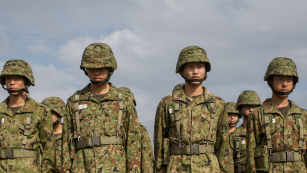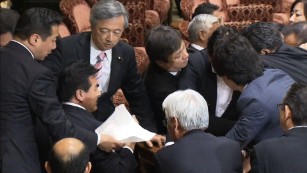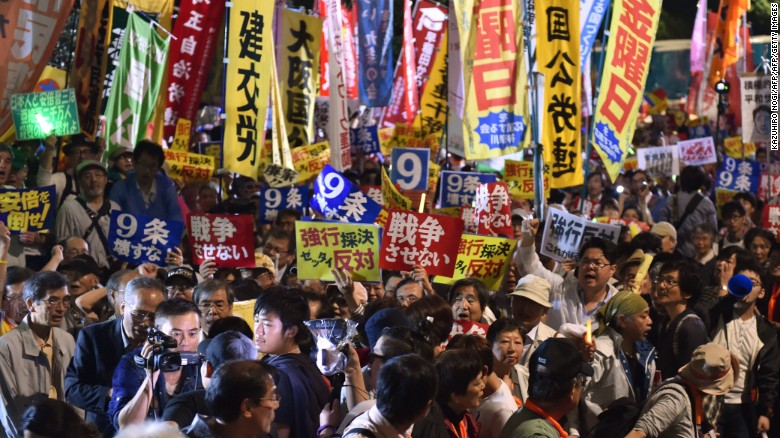Japanese lawmakers OK greater overseas role for military
Japan's upper chamber of Parliament early Saturday approved controversial bills allowing the country's military to engage in overseas combat in limited circumstances -- a major shift after seven decades of pacifism.
The 148-90 vote was the final hurdle for the measures, which will go into effect within roughly the next six months. The lower parliamentary chamber passed the bills in July.
The legislation reinterprets Article 9 of the Japan's pacifist post-World War II constitution, which outlaws war as a means of settling international disputes. The reinterpretation will now allow the Japanese military, known as the Self-Defense Forces, to defend its allies in a limited role in conflicts abroad.
Japanese troops operating overseas had previously been limited to humanitarian roles.
Article 9 of Japan's constitution says, in part, "Aspiring sincerely to an international peace based on justice and order, the Japanese people forever renounce war as a sovereign right of the nation and the threat or use of force as means of settling international disputes."

Why is Japan expanding its military?
The bills, championed by Prime Minister Shinzo Abe, sparked fierce and vocal opposition, with massive demonstrations in Tokyo streets in recent months and physical altercations in parliament this week.
A scuffle broke out Thursday as opposition lawmakers in a special committee of the Upper House attempted to delay a vote. But the bill ultimately passed the committee, setting the stage for Saturday's vote.
The argument for the bills
Supporters of the legislation, including top U.S. officials, say Japan needs to expand the role of the SDF to counter potential threats from nations such as China and North Korea. Both continue to develop their military and nuclear weapons programs.
Earlier this month, China staged its largest military parade ever to celebrate 70 years since Japan's World War II defeat. Beijing remains locked in territorial disputes with multiple Asian neighbors in the East and South China seas.
On Tuesday, North Korea warned the United States and its allies that it is ready to use nuclear weapons "at any time" and is expected to launch a new satellite using a long-range rocket sometime in the coming weeks.
Tokyo has faced growing international pressure to expand the role of its military, including deployment, to defend the interests of its key allies, including the United States. America is bound by treaty to defend Japan, an agreement that has been in place since 1960.
"Japan is like the 42-year-old kid still living in the basement of the United States," said longtime Asia strategist Keith Henry.
Henry's Tokyo-based consulting firm, Asia Strategy, provides governmental policy analysis. Henry likens the defense bills to Japan finally "growing up" and moving beyond vague concepts of peace and democracy that are no longer practical given today's rapidly changing geopolitical landscape.
Henry says Japan is assuming a more proactive role in regional security, in part to offset China's growing military might.
"Japan is moving out of the house of the U.S. that was essentially built after World War II," Henry said. "But there are risks involved in protecting one's national self interests."
The argument against

Japanese lawmakers get physical
Those potential risks have triggered outrage on the streets of Tokyo. Opponents of the legislation say seven decades of Japanese postwar pacifism are simply being tossed away without proper public debate or discourse. They worry about the consequences of potentially sending troops into battle without actual combat experience.
Tens of thousands of anti-war demonstrators have been gathering in recent weeks outside the Japanese Parliament building -- the largest demonstrations of their kind in Japan in more than 50 years. They are students and teachers, workers and retirees, grandchildren and grandparents.
Some wear work attire or school uniforms. Others have T-shirts, bandanas, or posters with spirited slogans like "No war! No Abe!" -- a message to the Prime Minister, who has grown increasingly unpopular in recent months for doggedly pushing the controversial security bills through parliament.
OPINION: Japanese PM comes up short on WWII history and contrition
Abe's face appears on posters with a Hitler-style mustache and Nazi swastika drawn on his forehead. The symbolism is clear. Some of these demonstrators view their Prime Minister as a dictator.
News Courtesy: www.cnn.com











